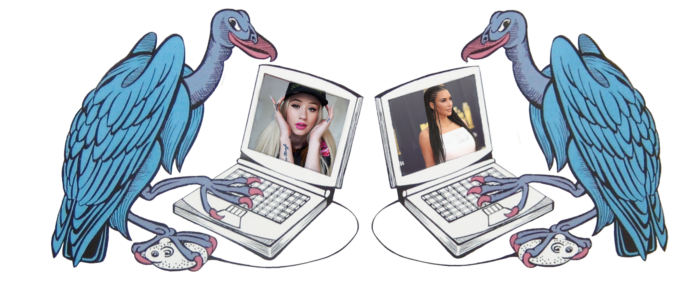Raymond Matthews
Opinions Editor
As a veteran of black Twitter, I’ve seen plenty of non-black influencers and celebrities get dragged by their spray-tan-stained-polyester-box-braid wigs for cultural appropriation. But as soon as they issue a haphazard Notes app apology, their non-black fans accept their non-apologies and the controversy blows over.
In these cases, cultural appropriation is usually excused as ignorance, but it seems that many non-black celebrities and influencers are doing it as a calculated marketing strategy that relies on black outrage for free publicity.
The strategy goes as follows: non-black celebrities and influencers appropriate popular black culture and aesthetics only to benefit from the publicity that comes with the subsequent outrage.
This trend arguably started with the Fashion-Nova-clad queen of appropriation herself, Kim Kardashian. From her infamous box braids, to her multiple blackface faux-pas, and her recent shapewear line “Kimono,” Kim is no stranger to appropriation.
One would think that this would get her cancelled immediately, but it has had the opposite effect. She offends black people, we express our outrage on social media, and she finds herself on trending pages and headlines all over the internet only to escape the outrage with a higher follower count.
More recently, social media mogul Nikita Dragun has carried on Kim’s legacy. She was seen in an Instagram story last week with a Kardashian-esque blackface spray tan and durag (a hair wrap that black people wear either as a fashion statement or to accelerate the development of waves, braids, or dreadlocks).
When black people called her out for appropriation, Dragun incorrectly explained what a durag is to all of black Twitter in an attempt to smooth things over *deep, negro spiritual sigh*. After that failed, she took to Twitter to announce to tell us all that she doesn’t, “como se dice… give a fuck.”
Jeffree Star, one of the most popular beauty influencers on YouTube, also landed in hot water recently for cultural appropriation after he wore a dreadlock wig to advertise his latest eyeshadow palette, but this is far from his first anti-black incident.
Star is infamous for calling black women “rats” and “gorillas,” shouting the n-word repeatedly, and suggesting that black people lighten our skin with battery acid.
But, like his peers Kim and Nikita, he escaped all of his anti-black controversies unscathed after his non-black fanbase accepted his non-apology that wasn’t theirs to accept in the first place.
This trend is so upsetting because it shows that black people’s frustration and outrage isn’t being met with empathy and understanding. Rather, it’s being exploited as a marketing tool by non-black people in powerful positions who degrade us and simultaneously steal our culture.
The fact that celebrities and influencers can wear blackface, harass black people with racial slurs, and appropriate our culture with no consequences shows that, in the words of Nikita Dragun, their fans don’t “como se dice… give a fuck.”












Why and how are women subjected to street harassment?
thank you
Comments are closed.